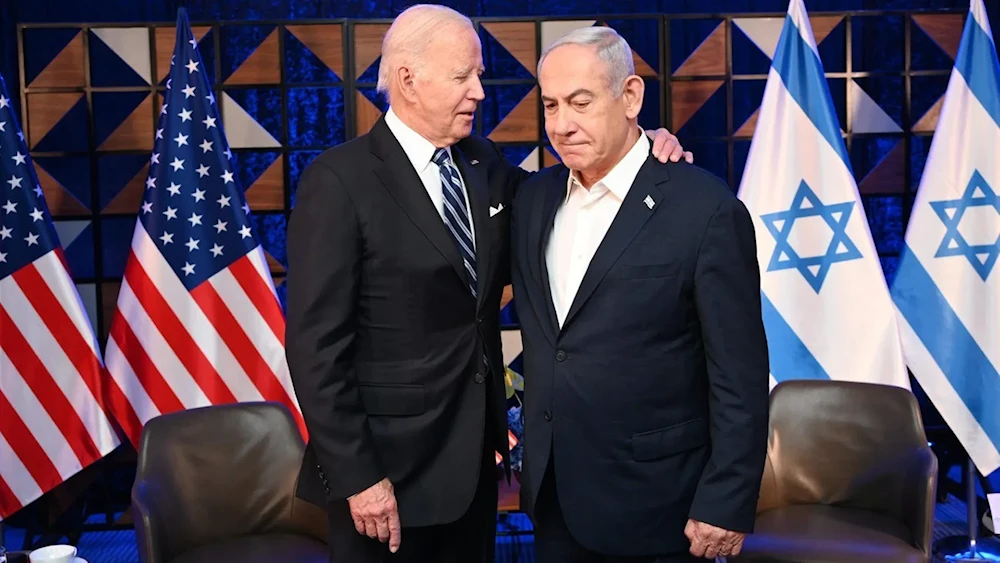US official says Iran retaliation would jeopardize Gaza ceasefire
Reuters reports that the US official threatened that an Iranian retaliation would "quite significant" consequences, particularly for Iran's economy.
-

US President Joe Biden with Israeli Prime Minister Benjamin Netanyahu in Tel Aviv, occupied Palestine, in October 2023 (White House handout)
A senior US administration official said that Iran has "no legitimate basis" to respond to the Israeli assassination of Hamas' politburo chief and lead ceasefire negotiator, martyr Ismail Haniyeh, while he was on an official visit in Tehran, and emphasized that the United States is prepared for any contingency, Reuters reported on Thursday.
US sanctions against the Islamic Republic began in 1979, following the successful Islamic Revolution that ousted the US-backed dictator, Shah Mohammad Reza Pahlavi.
Read more: Israelis do not know what awaits them: IRGC
The sanctions were significantly intensified when former President Donald Trump's administration unilaterally withdrew from the UN-recognized nuclear deal and launched a "maximum pressure" sanctions campaign. This campaign has severely impacted the Iranian people, as its effects included critical sectors such as health and food.
According to Reuters, the official threatened that the consequences of any Iranian military retaliation would be "quite significant," particularly for Iran's economy, without providing further details on how.
The official even tied Iran's response to the Israeli assassination to ending the genocide in Gaza.
"An Iranian escalation would jeopardize the hope of getting a ceasefire deal because the focus would shift," the official added.
Increased US military deployments
The US official also addressed the recent joint statement by President Joe Biden, Qatar's Emir Tamim Bin Hamad al-Thani, and Egyptian President Abdel Fattah al-Sisi, which called for finalizing a ceasefire and prisoner exchange deal on August 15 between Israeli regime and Palestinian Resistance movement Hamas. However, the official claimed that the statement is "not tied to the larger regional situation," but noted that if it influences Iran's decisions, "that's fine."
Read more: US warns Iran of 'severe consequences' in case of retaliation: WSJ
In their statement, the three leaders claimed that a framework agreement is ready and that all it needs to be finalized is to agree on implementation details.
But the official tempered expectations, stating that there is "no expectation that an agreement will be signed by next Thursday."
Meanwhile, Biden and Defense Secretary Lloyd Austin reviewed the bolstered US military deployments in the Middle East earlier today, signaling continued US readiness to respond to any developments.
In addition to assassinating Haniyeh, "Israel" also attacked a civilian power station in Yemen's Hodeidah, killing civil servants, and targeted a residential building in Beirut, killing five civilians – three women and two children – and a top Hezbollah military leader, Sayyed Fouad Shokor.
Read more: 'Israel' in nerve-wracking anticipation for Hezbollah, Iran response
Inevitable response
The Islamic Republic of Iran and its allies in the Resistance Axis are preparing for a military response to the Israeli killing of their citizens, and officials and attacks on their countries.
On the other hand, the United States is in the process of establishing a coalition after having mobilized its forces to protect "Israel" from retaliation.
During a tribute ceremony for martyred commander Sayyed Shokor on Tuesday, Hezbollah's leader Sayyed Hassan Nasrallah emphasized that the Israeli occupation had chosen to escalate tensions with both Lebanon and Iran when they conducted their terrorist operations in Beirut and Tehran, targeting not only Resistance leaders but also civilians.
He further affirmed that the Resistance's response is coming, "regardless of the consequences," referring to US and Israeli threats of that leading to an expanded or regional war.
Hamas elected on Tuesday leader Yahya Sinwar as the movement's new political bureau chief.
Read more: Nasrallah ushers in a new phase, asserts retaliation is inevitable

 4 Min Read
4 Min Read








